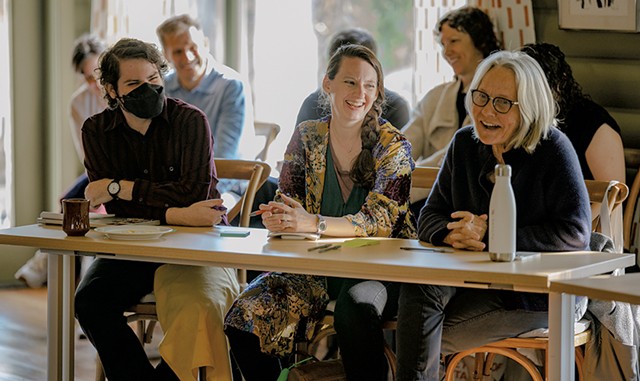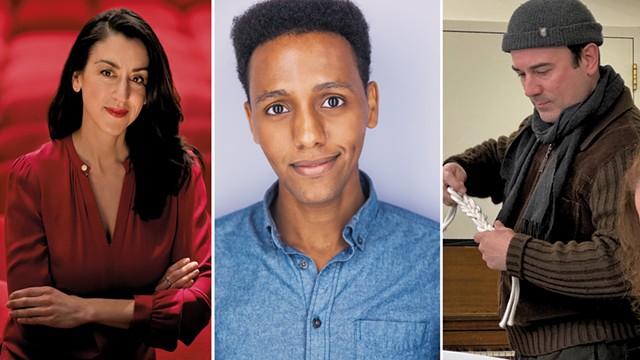
- Courtesy
- From left: Astrophysicist Jared Goldberg, writer Gracie Leavitt and creative producer Kay Matschullat
In 1919, astronomer Arthur Eddington used the positions of the stars during a total solar eclipse to provide evidence for Albert Einstein's theory of general relativity. This April 8, Vermonters viewing the total solar eclipse may not have quite such momentous ambitions. But a new play about Eddington's experiment will give them a chance to learn more about the history of eclipse science in advance of the big day.
When Light Bends tells the true story of how Eddington confirmed Einstein's theory about the relationship between space, gravity and time. Writers John Lopez and Gracie Leavitt interweave the historical tale with a modern-day story about two lovers rushing to reach the path of totality during the April 2024 solar eclipse. The touring show premieres at the Highland Center for the Arts in Greensboro on Friday, March 22. Following its weekend run, it moves to the Museum of Science in Boston on March 27. An additional stop in New York is still in the works.
While the play was created by the New York-based nonprofit Media Art Xploration, it was commissioned specifically for Vermont because of its location along the path of totality, according to Highland Center executive director Keisha Luce. The Simons Foundation, a philanthropic organization that aims to advance math and science research, is funding the show as part of its In the Path of Totality initiative, which involves hosting more than 100 events in anticipation of the once-in-a-lifetime celestial event.
The show's title comes from Einstein's theory, which holds that light bends around massive objects due to how they warp the fabric of space-time. During a solar eclipse, general relativity predicts that the sun's mass will cause starlight to bend, changing the stars' apparent positions in the sky. Four years after Einstein published his theory, Eddington's team set out to test the hypothesis by photographing the sky during a total solar eclipse. The scientists observed the predicted shifts in the stars' positions, providing crucial experimental confirmation of Einstein's theory.
Onstage, the actors convey such dense concepts through analogies, director Elena Araoz said. That method of elucidating physics comes from Einstein himself, who often explained his theories to the public through thought experiments. For example, he famously said a blind beetle crawling over the surface of a curved branch doesn't notice that the track is curved — a metaphorical expression of why we can't perceive the curvature of space-time. In the play, the lovers hiking to reach the path of totality encounter beetles on the trail, which then serve as an entry point to discussion of Einstein's theories, Araoz said.
"It's a constant push and pull as we try to make sense of this science so that we can help make sense of it for the audience," she said. "A great scientist can look at the world and see what we so easily ignore."

- Courtesy
- From left: Director Elena Araoz, actor Sam Kebede and illusion specialist Steve Cuiffo
One member of the team behind the show has an unusual background for the world of theater: Jared Goldberg, an astrophysicist who researches stars and plasma at the Flatiron Institute in New York City (a division of the Simons Foundation), helped workshop the script in the writers' room. He also gave presentations about general relativity and hosted "ask the physicist" Q&As for everyone on set.
Sam Kebede, the New York City-based actor who plays Eddington, said listening to Goldberg explain physics concepts was his best preparation for the role. Goldberg's expertise helped him get into the weeds, he said, including understanding the complex tensor calculus that Einstein used to develop his theory of relativity.
"It's not very often I get to combine acting, science and art," said Kebede, who was on track to become a neurosurgeon before he decided to pursue a career in acting. "I always find that the melding of different disciplines breeds some of the best creativity."
The play incorporates magic tricks to demonstrate physics concepts. Illusion designer Steve Cuiffo worked with Goldberg to create gravity-related ploys such as levitation to help audience members grasp the science, he said.
"Magic can connect with the audience in a slightly different way that's not totally intellectual," Cuiffo said. "It enhances some of the [scientific] explanation."
Composer Tamar Muskal created an original score for the show, which includes a live violinist and recorded voices playing in the background. The choice of instrument is a nod to Einstein, who played the violin and famously said he lived his "daydreams in music."
The combination of all these elements has produced a show that accurately honors Einstein's theories while remaining accessible to a general audience, according to Goldberg. The story is also mostly historically accurate, though Araoz noted that the writers took some artistic liberties in depicting two female characters: Winifred Eddington, the sister of Arthur Eddington; and Mileva Mari, Einstein's first wife, who was also a physicist. There is debate about the extent to which Mari contributed to the development of Einstein's theories.
"I don't think geniuses exist in a vacuum," said Los Angeles-based actor Victoria Frings, who plays both Winifred and Jen, one of the lovers trying to reach the path of totality. Eddington's sister "serves to keep him grounded, humbled, and [to make him] remember why he's doing this work."
Whether the play encourages viewers to explore its historical, political or scientific contexts, Araoz said she hopes audiences will come away with a greater sense of why the upcoming eclipse is significant.
"We'll never onstage be able to cultivate what a real eclipse might feel like, when the temperature goes down and all the crickets start going," she said. But she hopes the play will generate excitement "to go out and see the real eclipse" — no scientific discoveries necessary.











Comments
Comments are closed.
From 2014-2020, Seven Days allowed readers to comment on all stories posted on our website. While we've appreciated the suggestions and insights, right now Seven Days is prioritizing our core mission — producing high-quality, responsible local journalism — over moderating online debates between readers.
To criticize, correct or praise our reporting, please send us a letter to the editor or send us a tip. We’ll check it out and report the results.
Online comments may return when we have better tech tools for managing them. Thanks for reading.